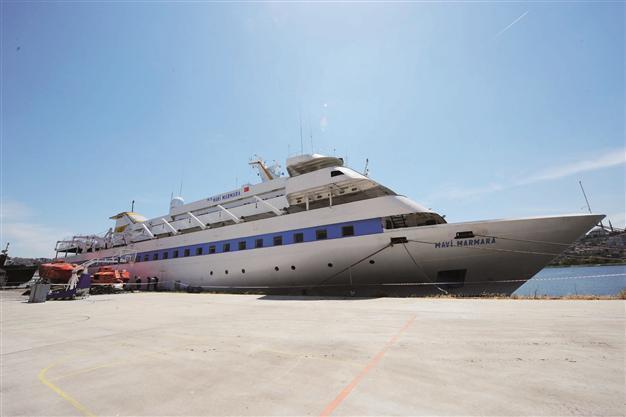Israel appeals to Interpol not to implement Turkish court’s ruling
ANKARA

Israeli commandoes raided the Mavi Marmara on May 31, 2010. Amos Yadlin, a former intelligence chief (inset), is among the four generals on trial in absentia. DAILY NEWS photo
Israel has appealed to Interpol not to honor a ruling from a Turkish court that issued arrest warrants on May 26 for four former Israeli military commanders on trial in absentia over the 2010 killing of nine Turks on the Gaza-bound Mavi Marmara.In its appeal to Interpol, Israel suggested that the Turkish court’s ruling was “tainted by political motives” and that Interpol should accordingly not carry it out, leading English-language Israeli daily The Jerusalem Post reported yesterday.
In its report, citing Hebrew-language daily newspaper Ma’ariv, The Jerusalem Post cited Interpol statutes saying the force does not intervene in proceedings related to political or military affairs. According to The Jerusalem Post, “it is more than likely that they will not put out international arrest warrants for the four officers.”
In its ruling on May 26, the Istanbul 7th Court of Serious Crimes decided to request an Interpol Red Notice for the arrest of former Israeli Chief of Staff Gen. Gabi Ashkenazi, former Naval Forces Cmdr. Eliezer Alfred Marom, former military intelligence chief Maj. Gen. Amos Yadlin and former Air Forces Intelligence head Brig. Gen. Avishai Levi, who are all being tried in absentia.
Yadlin, who now heads Israel’s National Institute for Strategic Studies, was swift to dismiss the court’s ruling.
“I won’t be visiting Turkey, just like I won’t be visiting Syria, Iran or North Korea,” Yadlin was quoted as saying by Reuters news agency.
The Istanbul court’s move came after months of negotiations between old allies Turkey and Israel to end the diplomatic crisis over the Israeli commando raid in 2010 on the Mavi Marmara, a Turkish ship challenging Israel’s naval blockade of the Gaza Strip. Eight Turks and a Turkish-American were killed in the operation, while a Turkish man, Süleyman Uğur Söylemez, died in hospital on May 23 after four years in a coma since the raid.
But in Ankara, Prime Minister Recep Tayyip Erdoğan argued that the ruling would not have an impact on the ongoing normalization process between his country and Israel.
Erdoğan, speaking to reporters on May 27, recalled that the normalization process was an initiative by the executive body. The court cases against Israeli officials, however, were initiated by families of victims or of those who were wounded in the attack, meaning they should be assessed as a separate process, he said.
“The court case opened by families of our martyrs or of our wounded ones is not an initiative of ours. We cannot influence that,” Erdoğan told reporters, recalling that he stated the same thing when the normalization process with Israel began, too. He was asked whether the court ruling would have any impact on ongoing negotiations with Israel.
“This [normalization] process began under these conditions,” Erdoğan said, adding that his government was not in a position to make a decision on behalf of those people who were actually custodians of those “martyrs.”
“We do not have such right either. This is a separate issue and ours is a separate issue at the state level,” he added.
For his part, Justice Minister Bekir Bozdağ took pains to not make any comment on the ruling, saying he needed to see the detailed ruling in order to be able to make any remarks.
While noting that he was not aware of the details of the normalization process, Bozdağ, said: “Our Foreign Ministry knows better at which stage they are. Of course, this ruling will have some impacts.”
The justice minister, however, did not elaborate on any possible impact.
















